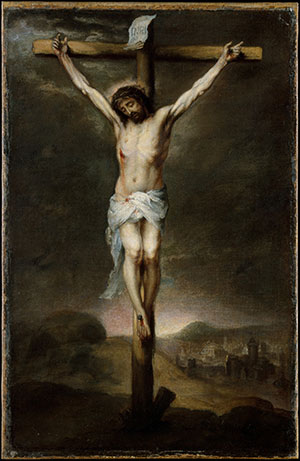 Every year we read the incredible passage from the second chapter of Philippians that speaks of how the Son of God emptied Himself to enter into humanity by becoming one with us. Every month priests, deacons, religious and many lay persons read and pray that passage in the Liturgy of the Hours. Because it is so familiar, we seldom take to heart how incredible it really is.
Every year we read the incredible passage from the second chapter of Philippians that speaks of how the Son of God emptied Himself to enter into humanity by becoming one with us. Every month priests, deacons, religious and many lay persons read and pray that passage in the Liturgy of the Hours. Because it is so familiar, we seldom take to heart how incredible it really is.
Consider fairy tales for a moment. It is not uncommon in fairy tales for a prince or a princess, who falls in love with a commoner, to disguise him or herself as an ordinary person in order to win the heart and the hand of the one whom he or she loves. They don’t want the poor man or woman to be overwhelmed by them or to say “yes” to them because he or she is dazzled by their riches and prestige. No, they want to be loved for themselves. Only then do they reveal who they are.
 Jesus went infinitely further. Not only is He God, the Second Person of the Blessed Trinity, but, as Philippians tell us: “He did not regard equality with God something to be grasped. Rather, He emptied Himself, taking the form of a slave, coming in human likeness, and found human in appearance, He humbled Himself…” (2:6-8).
Jesus went infinitely further. Not only is He God, the Second Person of the Blessed Trinity, but, as Philippians tell us: “He did not regard equality with God something to be grasped. Rather, He emptied Himself, taking the form of a slave, coming in human likeness, and found human in appearance, He humbled Himself…” (2:6-8).
Think about that for a moment. Let it sink in: the God of the universe, Creator of all that is, decides to enter into the history of a small planet that rotates around an average star in the Milky Way galaxy. God so humbles Himself that God not only enters into human life, but God depends on a human being to become one with us. What an amazing young woman He chooses to ask:
“Mary, will you become the Mother of the Messiah?” And the angel Gabriel tells her that “you will conceive in your womb and bear a son, and you shall name Him Jesus.” (Lk 1:31). In Hebrew the name is “Yeshua,” a name that means “Yahweh saves,” for He will save His people from their sins.
The Son of God empties Himself because He is love, and He finds love in the womb of Mary, and then, once born, in the care of Mary and Joseph. But Jesus’ love was not completed by becoming human and showing us what humanity is called to be. No, Jesus loved us to the end, embracing even death, “death upon the cross.” From conception to death, He embraced humanity to the full, and then bestowed an infinite gift upon us, the gift that only divinity can give – He resurrected to give us the loving gift of eternal life.
It is only right that we return love for love. But Jesus tells us that we cannot love the God whom we do not see, unless we love the brothers and sisters whom we do see: “Whatsoever you do to the least of my brothers and sisters, you do to me” (Mt 25:40).
St. Paul urges us to respond generously with love. “If there is any encouragement in Christ, any solace in love, any participation in the Spirit, any compassion and mercy, complete my joy by being of the same mind, with the same love, united in heart, thinking one thing. Do nothing out of selfishness or out of vainglory; rather, humbly regard others as more important than yourselves, each looking not for his own interests, but also those of others. Have the same attitude among yourselves that is also yours in Christ Jesus.” (Phil 2:1-5).
Will we empty ourselves for others? Will we even embrace the cross, if that is our calling? Will we embrace life and death, trusting all to the Father’s love, as Jesus did? Or will we turn away?
We cannot do it on our own. That is why Jesus sent us the Holy Spirit. In Christ and in the power of the Holy Spirit, “I can do all things in Him who strengthens me” (Phil 4:13)
Let us pray: Lord Jesus, send us your Spirit that we might embrace your attitude of love and service. Help us to empty ourselves of selfishness and greed, of anger and untruth, of timidity and fear. Help us to live in you. We ask this of the Father in Jesus’ Name and in the power of the Holy Spirit. Amen.
Jesuit Father John Michalowski is the parochial vicar of St. Peter Church in Charlotte.


